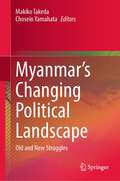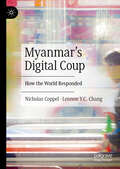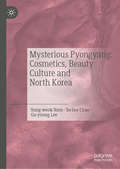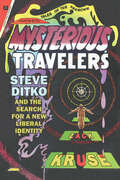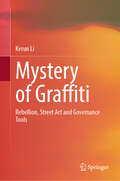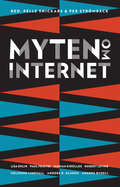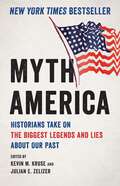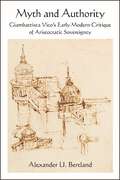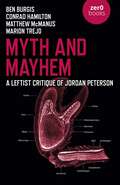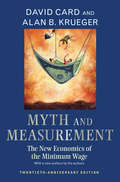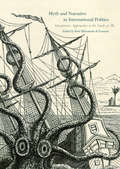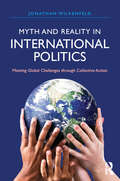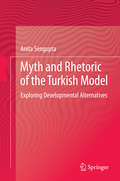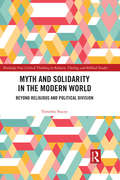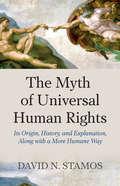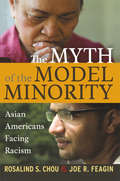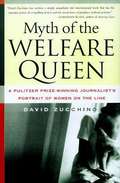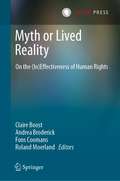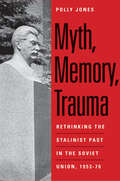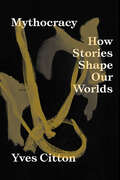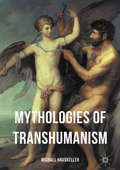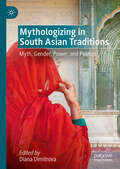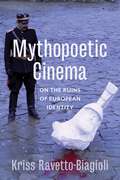- Table View
- List View
Myanmar’s Changing Political Landscape: Old and New Struggles
by Makiko Takeda Chosein YamahataMyanmar has faced numerous divisions that hinder its democratization and peacebuilding processes since emerging out of decades of military dictatorship. The coup d’état in 2021 terminated Myanmar’s limited and nascent democratization under the civilian leadership of the National League for Democracy (NLD); not only did the coup regime resurface old struggles, but also created new ones. Against the backdrop of Myanmar’s changing political landscapes from military to quasi-civilian to civilian rule in 2016, and back to military rule in 2021, the book discusses the various forms of interconnected struggles, both old and new. In this process, the contributed chapters come together to highlight the changing dynamics of stakeholders, relations between agents and beneficiaries, and the generated evolutionary processes in Myanmar’s democratization and its reversal. This book brings an even mix of researchers both within and outside of Myanmar to critically discuss how different agents and their interactions, in the form of center-periphery as well as state-non-state relations, continuously shape today’s political landscape. Its interdisciplinary composition also invites readers from various backgrounds to grasp with engaged research that identifies the various challenges and addresses ways in which to facilitate change from local and international perspectives.
Myanmar’s Digital Coup: How the World Responded
by Lennon Y.C. Chang Nicholas CoppelThis book explores the nature, scope, merits and limits of international responses to Myanmar’s February 2021 coup. The novelty of this book lies in its analysis of the coup in the digital age. While the literature on Myanmar addresses issues such as earlier periods of reform, Myanmar’s political transition, the Saffron revolution, and human rights, there is still limited research that looks into the influence of digitalised Myanmar on the post-coup Civil Disobedience Movement and protestors. Myanmar opened and changed enormously in the past ten years. The use of technology and the Internet increased phenomenally, exposing Myanmar’s citizenry to new ideas, experiences and ways of viewing the world. The impact of these developments on responses to the 2021 coup is the focus of this book.Myanmar’s opening to the world and its digitalisation has made this coup different from the three previous coups. The book's starting point is that diplomacy is no longer (if it everwas) the preserve of governments and diplomats. International organisations, not-for-profit organisations, large corporations, academia, civil society, social media, and even individuals have all been engaged and sought to influence developments.Drawing extensively on primary sources (official statements by UN agencies, foreign governments, international corporations, NGOs and Burma campaign activists) and experiences as a senior diplomat and an academic working with Myanmar’s government to build cyber capacity and cyber security awareness, this book takes a fresh look at all forms of international behaviour that seek to bring about change in a rogue or pariah state. The book will be the first to study the part played by Gen Z and their facility with smart phone technology to mobilise, inform and build opposition to the coup. To what extent did the youth of Myanmar learn from Hong Kong, Taiwan, Thailand and the so-called “milk tea alliance”? How has dependenceon the internet affected the operations of the security forces and the Civil Disobedience Movement? How did both sides deploy misinformation and disinformation to achieve their respective goals?The book thus provides an informative guide for those seeking an understanding of what has happened and what, short of a military intervention, can be done about it. It examines international responses in the first year following the coup, candidly assessing their feasibility, efficacy and utility. Recent developments are situated within the context of Myanmar’s modern history and the discourse on the effectiveness of sanctions compared with engagement.The book also critically examines ASEAN’s role – how does ASEAN see its role, how does the National Unity Government regard ASEAN endeavours, and how does the rest of the world view ASEAN’s capacity to address Myanmar’s problems? We evaluate ASEAN’s principle of non-interference in the internalaffairs of member states. Does this principle matter more to it than judgments about its weakness and inability to deal with breaches of the ASEAN Charter?
Mysterious Pyongyang: Cosmetics, Beauty Culture and North Korea
by Nam Sung-wook Chae Su-lan Lee Ga-youngThis book is written with the belief that the peaceful unification of Korean Peninsula will be upon us on the day that every woman in North Korea uses South Korean and global cosmetics. The authors focus on understanding the intentions behind the three leaders of North Korea, Kim Il-sung, Kim Jong-il and Kim Jong-un, based on their comments on the cosmetics industry and their field guidance tendencies, analyzing the governance style of Pyongyang through women’s life and beauty culture. It is the earliest book of its kind in the women’s life and beauty culture of North Korea.
Mysterious Travelers: Steve Ditko and the Search for a New Liberal Identity (Great Comics Artists Series)
by Zack KruseSteve Ditko (1927–2018) is one of the most important contributors to American comic books. As the cocreator of Spider-Man and sole creator of Doctor Strange, Ditko made an indelible mark on American popular culture. Mysterious Travelers: Steve Ditko and the Search for a New Liberal Identity resets the conversation about his heady and powerful work. Always inward facing, Ditko’s narratives employed superhero and supernatural fantasy in the service of self-examination, and with characters like the Question, Mr. A, and Static, Ditko turned ordinary superhero comics into philosophic treatises. Many of Ditko’s philosophy-driven comics show a clear debt to ideas found in Ayn Rand’s Objectivism. Unfortunately, readers often reduce Ditko’s work to a mouthpiece for Rand’s vision. Mysterious Travelers unsettles this notion. In this book, Zack Kruse argues that Ditko’s philosophy draws on a complicated network of ideas that is best understood as mystic liberalism. Although Ditko is not the originator of mystic liberalism, his comics provide a unique window into how such an ideology operates in popular media. Examining selections of Ditko’s output from 1953 to 1986, Kruse demonstrates how Ditko’s comics provide insight into a unique strand of American thought that has had a lasting impact.
Mystery of Graffiti: Rebellion, Street Art and Governance Tools
by Kerun LiThis book offers an in-depth look at the development, social significance, and role of graffiti in China’s local culture. By examining the graffiti phenomenon in Xiamen University's Furong Tunnel, it uncovers the multifaceted contexts and meanings behind graffiti as a complex social and cultural phenomenon. The main theme is the transformation of graffiti in China from rebellious street art to a tool for urban governance and beautification by authorities and capital. This shift reflects China's unique socio-cultural background and highlights the interactions and conflicts among various stakeholders. Using literature review, field observation, and in-depth interviews, the book explores the multiple roles and meanings of graffiti in China. Firstly, it delves into the definition and historical evolution of graffiti. In the West, graffiti evolved from marginalized youth signatures to street art. In China, graffiti is often associated with government and capital collaboration, used to beautify urban landscapes and for official propaganda. Despite strict scrutiny and lack of political implications, graffiti thrives in public spaces, manifesting collective action over individual expression. Secondly, the book examines graffiti's dual role in urban governance. It is seen both as vandalism symbolizing urban decay and as artistic creativity revitalizing spaces and attracting tourists. The book highlights graffiti's positive role in urban renewal and tourism, noting local government support and sponsorship for urban beautification and promotion. The book also discusses graffiti in local collective memory and public spaces, using the Furong Tunnel as an example. It shows how graffiti transformed the tunnel from a functional passageway into a popular spot with local collective memory, beautifying the environment and fostering interactions between students and visitors. The book analyzes how graffiti shapes the sense of place, becoming a local cultural identifier and connecting cultural landmarks.
Mystic City
by Theo LawrenceA magical city divided. A political rebellion ignited. A love that was meant to last forever.Aria Rose, youngest scion of one of Mystic City's two ruling rival families, finds herself betrothed to Thomas Foster, the son of her parents' sworn enemies. The union of the two will end the generations-long political feud--and unite all those living in the Aeries, the privileged upper reaches of the city, against the banished mystics who dwell below in the Depths. But Aria doesn't remember falling in love with Thomas; in fact, she wakes one day with huge gaps in her memory. And she can't conceive why her parents would have agreed to unite with the Fosters in the first place. Only when Aria meets Hunter, a gorgeous rebel mystic from the Depths, does she start to have glimmers of recollection--and to understand that he holds the key to unlocking her past. The choices she makes can save or doom the city--including herself.
Myten om internet
by Robert Levine Pelle Snickars Mariam Kirollos Paul Frigyes Lisa Ehlin Anders R. Olsson Helienne Lindvall Per Strömbäck Anders RydellVilken funktion hade egentligen sociala medier under den arabiska våren? Vilka är den digiala underklassen? Och hur har en handfull teknikföretag i Silicon Valley lyckats sprida ryktet om sig själva som det fria ordet och kunskapens främsta förespråkare När internet ska diskuteras används ofta begrepp som frihet, demokrati och delaktighet. Att internet har haft en otrolig betydelse tvivlar ingen på, men samtidigt finns en mängd löst grundade föreställningar att internet kommer infria alla förhoppningar, en sorts tekno-utopi. Internet är på ett plan öppet och fritt, men lika mycket är det skapat av offentliga regleringar, teknik och affärsintressen. 85 procent av de så kallade stadsnäten ägs av kommunala bolag. Den grundläggande infrastrukturen för nätet i Sverige är alltså i allmän ägo, tvärtemot den gängse bilden att internet drivs av marknadskrafterna. I Myten om internet har såväl svenska som internationella namn samlats för att nyansera bilden av internet, och inte minst blottlägga vilka som har gynnats av de rådande föreställningarna. Bland skribenterna märks egyptiska Mariam Kirollos, aktivist och doktorand, som starkt ifrågasätter hyllningarna av sociala mediers roll i den arabiska våren, och Robert Levine, amerikansk författare och journalist, som utkom med den mycket uppmärksammade boken Free Ride 2011.
Myth America: Historians Take On the Biggest Legends and Lies About Our Past
by Julian E. Zelizer Kevin M. KruseIn this instant New York Times bestseller, America&’s top historians set the record straight on the most pernicious myths about our nation&’s past. The United States is in the grip of a crisis of bad history. Distortions of the past promoted in the conservative media have led large numbers of Americans to believe in fictions over facts, making constructive dialogue impossible and imperiling our democracy. In Myth America, Kevin M. Kruse and Julian E. Zelizer have assembled an all-star team of fellow historians to push back against this misinformation. The contributors debunk narratives that portray the New Deal and Great Society as failures, immigrants as hostile invaders, and feminists as anti-family warriors—among numerous other partisan lies. Based on a firm foundation of historical scholarship, their findings revitalize our understanding of American history. Replacing myths with research and reality, Myth America is essential reading amid today&’s heated debates about our nation&’s past. With Essays ByAkhil Reed Amar • Kathleen Belew • Carol Anderson • Kevin Kruse • Erika Lee • Daniel Immerwahr • Elizabeth Hinton • Naomi Oreskes • Erik M. Conway • Ari Kelman • Geraldo Cadava • David A. Bell • Joshua Zeitz • Sarah Churchwell • Michael Kazin • Karen L. Cox • Eric Rauchway • Glenda Gilmore • Natalia Mehlman Petrzela • Lawrence B. Glickman • Julian E. Zelizer
Myth and Authority: Giambattista Vico's Early Modern Critique of Aristocratic Sovereignty (SUNY series in Contemporary Italian Philosophy)
by Alexander U. BertlandLiving in a province dominated by powerful oligarchs, Giambattista Vico (1668–1744) concluded that political philosophy should work to undermine aristocratic authority and prevent political devolution into feudalism. Rejecting the possibility that the free market could successfully instill civil behavior, he advocated for a strong central judicial system to work closely with citizens to promote stability and justice. This study puts Vico in conversation with other Enlightenment thinkers such as Locke, Rousseau, and Mandeville to show how his alternative warrants serious consideration. In contrast to scholars who read Vico's New Science as a defense of the imagination, this study casts his account of poetic wisdom politically as an epistemological critique of the aristocratic mentality. Myth and Authority argues that Vico's depiction of pagan religion is a refined attempt to explain how oligarchy maintains its stranglehold on power. While Western civilization did not follow the path Vico suggested, it may now be more relevant as concerns grow about the increasing influence of the wealthy on civil institutions.
Myth and Mayhem: A Leftist Critique of Jordan Peterson
by Matthew McManus Ben Burgis Conrad Bongard Hamilton Marion TrejoJordan Peterson rocketed to fame in the 2010s and has preached on everything from the evils of postmodern neo-Marxism to the mating habits of lobsters ever since then. The Left has since leveled many criticisms about the Canadian psychologist, characterizing him as everything from an apologist for the alt-right to simply not being interesting or profound. Myth and Mayhem: A Leftist Critique of Jordan Peterson is intended as a comprehensive critical look at all aspects of his thought, from the philosophical depths to the mundane heights. Written by four authors who each look at a different element of his thought, it shows why taking Peterson seriously doesn't mean embracing him. Includes an introduction by Slavoj Zizek
Myth and Measurement
by Alan B. Krueger David CardDavid Card and Alan B. Krueger have already made national news with their pathbreaking research on the minimum wage. Here they present a powerful new challenge to the conventional view that higher minimum wages reduce jobs for low-wage workers. In a work that has important implications for public policy as well as for the direction of economic research, the authors put standard economic theory to the test, using data from a series of recent episodes, including the 1992 increase in New Jersey's minimum wage, the 1988 rise in California's minimum wage, and the 1990-91 increases in the federal minimum wage. In each case they present a battery of evidence showing that increases in the minimum wage lead to increases in pay, but no loss in jobs. A distinctive feature of Card and Krueger's research is the use of empirical methods borrowed from the natural sciences, including comparisons between the "treatment" and "control" groups formed when the minimum wage rises for some workers but not for others. In addition, the authors critically reexamine the previous literature on the minimum wage and find that it, too, lacks support for the claim that a higher minimum wage cuts jobs. Finally, the effects of the minimum wage on family earnings, poverty outcomes, and the stock market valuation of low-wage employers are documented. Overall, this book calls into question the standard model of the labor market that has dominated economists' thinking on the minimum wage. In addition, it will shift the terms of the debate on the minimum wage in Washington and in state legislatures throughout the country.With a new preface discussing new data, Myth and Measurement continues to shift the terms of the debate on the minimum wage.
Myth and Narrative in International Politics
by Berit Bliesemann de GuevaraThis book systematically exploreshow different theoretical concepts of myth can be utilised to interpretivelyexplore contemporary international politics. From the international communityto warlords, from participation to effectiveness - international politics isreplete with powerful narratives and commonly held beliefs that qualify asmyths. Rebutting the understanding of myth-as-lie, this collection of essaysunearths the ideological, naturalising, and depoliticising effect of myths. Myth and Narrative inInternational Politics: Interpretive Approaches to the Study of IRoffers conceptual and methodological guidance on how to make sense of differentmyth theories and how to employ them in order to explore the powerfulcollective imaginations and ambiguities that underpin international politicstoday. Further, it assembles case studies of specific myths in different fieldsof International Relations, including warfare, global governance,interventionism, development aid, and statebuilding. The findings challengeconventional assumptions in International Relations, encouraging academics in IR and across a range of different fieldsand disciplines, including development studies, global governance studies,strategic and military studies, intervention and statebuilding studies, andpeace and conflict studies, to rethink ideas that are widely unquestioned bypolicy and academic communities.
Myth and Reality in International Politics: Meeting Global Challenges through Collective Action (International Studies Intensives Ser.)
by Jonathan WilkenfeldRecent generations have experienced dramatic improvements in the quality of human life across the globe. Wars between states are fought less frequently and are less lethal. Food is more plentiful and more easily accessed. In most parts of the world, birthrates are down and life expectancy up. Significantly fewer people live in extreme poverty, relative to the overall population. Statistics would argue that the human race has never before flourished as it has in this moment.And yet, even with this progress, we face a number of seemingly intractable challenges to the welfare of both states and individuals, including: Governmental instability undermining the lives of citizens, both within and beyond their borders; Persistent and recurring intrastate conflict due to ineffective conflict management strategies; Marginally successful development efforts and growing income inequality, both within and between nations, as a result of uncoordinated and ineffective global development strategies; Internecine conflict in multiethnic societies, manifested by exclusion, discrimination, and ultimately violence, the inevitable consequence of an insufficient focus on managing the inherent tensions in diverse societies; Global climate change with the possibility of catastrophic long-term consequences, following an inability to effectively come to terms with and respond to the impact of human activity on our environment. These challenges require a newly collaborative, intentional, and systematic approach. This book offers a blueprint for how to get there, calling for increased leadership responsibility, clarity of mission, and empowerment of states and individuals. It is designed to transform lofty but often vague agendas into concrete, measurable progress. It believes in the capacity of humanity to rise to the occasion, to come together to address these increasingly critical global problems, and offers one way forward.
Myth and Rhetoric of the Turkish Model
by Anita SenguptaThe volume discusses what the Turkish Model, or Turkish Development Alternative, was and why it was promoted in the Central Asian republics immediately following the dissolution of the Soviet Union. It argues that the Turkish Model was a myth that transferred the ideal of a ''secular, democratic, liberal society'' as a model for the post Soviet Turkic world and in the process encouraged a ''Turkic" rhetoric that emphasized connection between the two regions based on a common ancestry. The volume begins with an understanding of the reality of the Model from a Turkish perspective and then goes on to examine whether the Turkic world as a "cultural-civilizational alternative" makes sense both from a historical as well as contemporary perspective. It concludes by looking at the re-emergence of the Model in the wake of the events in West Asia in early 2011 and examines how in the light of a search for options the Turkish Model is once again projected as viable.
Myth and Solidarity in the Modern World: Beyond Religious and Political Division (Routledge New Critical Thinking in Religion, Theology and Biblical Studies)
by Timothy StaceyIn the context of the rise of reactionary politics across the globe, this book seeks new ways of developing solidarity across religious, political and economic differences. Drawing on an increasingly influential Christian theological movement, postliberalism, it claims that the dominance of liberal, secular rationality has blinded people to the fundamental role of transcendence and myth in developing solidarity. The result is either atrophy, or a retrenching in divisive myths of faith, race, nation or economic status. Liberalism is now a dominant force across the globe. But its resonance in the Anglo-Saxon West, from which it originates and has been most fully realized, is relatively underexplored. The book thus follows two simultaneous lines of enquiry. Firstly, a genealogical study of social scientific and policy iterations of the relationship between belief and solidarity in the Anglo-Saxon West, placing postliberal theory into dialogue with the sociology and anthropology of religion, politics and economics. Secondly, it draws from original ethnographic research with groups in London, UK, that seek to develop solidarity in the face of deep-seated difference. By bringing a new way of framing these contentious debates about contemporary society, this research offers tools for more productive conversations around religious and political topics, in particular concluding with a clear policy proposal. It is, therefore, a useful resource for both academics of theology and religious studies, political philosophy, sociology and anthropology; and for politicians, policy makers and practitioners hoping to develop solidarity in the modern world.
Myth of Universal Human Rights: Its Origin, History, and Explanation, Along with a More Humane Way
by David N. StamosIn this groundbreaking and provocative new book, philosopher of science David N. Stamos challenges the current conceptions of human rights, and argues that the existence of universal human rights is a modern myth. Using an evolutionary analysis to support his claims, Stamos traces the origin of the myth from the English Levellers of 1640s London to our modern day. Theoretical defenses of the belief in human rights are critically examined, including defenses of nonconsensus concepts. In the final chapter Stamos develops a method of naturalized normative ethics, which he then applies to topics routinely dealt with in terms of human rights. In all of this Stamos hopes to show that there is a better way of dealing with matters of ethics and justice, a way that involves applying the whole of our evolved moral being, rather than only parts of it, and that is fiction-free.
Myth of the Model Minority: Asian Americans Facing Racism
by Joe R. Feagin Rosalind S. ChouWith their apparent success in schools and careers, Asian Americans have long been viewed by white Americans as the "model minority." Yet few Americans realize the lives of many Asian Americans are constantly stressed by racism. This reality becomes clear from the voices of Asian Americans heard in this first in-depth book on the experiences of racism among Asian Americans from many different nations and social classes. Chou and Feagin assess racial stereotyping and discrimination from dozens of interviews across the country with Asian Americans in a variety of settings, from elementary schools to colleges, workplaces, and other public arenas. They explore the widely varied ways of daily coping that Asian Americans employ-some choosing to conform and others actively resisting. This book dispels notions that Asian Americans are universally "favored" by whites and have an easy time adapting to life in American society. The authors conclude with policy measures that can improve the lives not only of Asian Americans but also of other Americans of color.
Myth of the Welfare Queen: A Pulitzer Prize-winning Journalist's Portrait of Women on the Line
by David ZucchinoPulitzer Prize-winning reporter David Zucchino spent a year sharing the lives of Odessa Williams and Cheri Honkala -- two "welfare mothers" in Philadelphia -- to gain an intimate look at their day-to-day existence. Odessa, supporting an extended family, exhibits almost superhuman strength and resolve. Cheri, a single mother, is a tireless advocate for the homeless. Zucchino beautifully portrays them as figures of profound courage and quiet perseverance, systematically shattering all misconceptions and stereotypes about these women and so many others like them.
Myth or Lived Reality: On the (In)Effectiveness of Human Rights
by Andrea Broderick Claire Boost Fons Coomans Roland MoerlandChapters How Human Rights Cross-Pollinate and Take Root: Local Governments & Refugees in Turkey by Elif Durmuş and Human Rights Localisation and Individual Agency: From ‘Hobby of the Few’ to the Few Behind the Hobby by Tihomir Sabchev, Sara Miellet, and Elif Durmuş are available open access under a Creative Commons Attribution 4.0 International License via link.springer.comThis book seeks to explore, from a multidisciplinary perspective, whether human rights are, in fact, a myth or a lived reality. Over the years much has been said about their effectiveness or, rather, their ineffectiveness.This perceived ineffectiveness relates not only to institutional challenges at the international level, but also to national implementation mechanisms and processes. In addition, questions have arisen as to whether individuals or groups of individuals actually benefit from the normative guarantees contained in human rights law and whether human rights as legal constructs can be effectively translated into better outcomes.This volume can be distinguished from the existing literature by virtue of the fact that it not only brings together scholars at different stages of their careers, but also that it incorporates contributions that adopt different methodological perspectives and cover a variety of topics.The book should prove of great benefit to human rights researchers, human rights practitioners, NGOs and students.Claire Boost is a PhD Candidate at the Department of Criminal Law and Criminology, Maastricht University.Andrea Broderick is an Assistant Professor at the Department of International and European Law, Maastricht University.Fons Coomans is a Professor at the UNESCO Chair in Human Rights and Peace, Department of International and European Law, Maastricht University.Roland Moerland is an Assistant Professor at the Department of Criminal Law and Criminology, Maastricht University.
Myth, Memory, Trauma
by Polly JonesDrawing on newly available materials from the Soviet archives, Polly Jones offers an innovative, comprehensive account of de-Stalinization in the Soviet Union during the Khrushchev and early Brezhnev eras. Jones traces the authorities' initiation and management of the de-Stalinization process and explores a wide range of popular reactions to the new narratives of Stalinism in party statements and in Soviet literature and historiography. Engaging with the dynamic field of memory studies, this book represents the first sustained comparison of this process with other countries' attempts to rethink their own difficult pasts, and with later Soviet and post-Soviet approaches to Stalinism.
Myth, Protest and Struggle in Okinawa (The University of Sheffield/Routledge Japanese Studies Series)
by Miyume TanjiOkinawan people have developed a unique tradition of protest in their long history of oppression and marginalization. Beginning with the Ryukyu Kingdom’s annexation to Japan in the late nineteenth century, Miyume Tanji charts the devastation caused by the Second World War, followed by the direct occupation of post-war Okinawa and continued presence of the US military forces in the wake of reversion to Japan in 1972. With ever more fragmented organizations, identities and strategies, Tanji explores how the unity of the Okinawan community of protest has come to rest increasingly on the politics of myth and the imagination. Drawing on original interview material with Okinawan protestors and in-depth analysis of protest history, Myth, Protest and Struggle in Okinawa will appeal to scholars of Japanese history and politics, and those working on social movements and protest.
Mythocracy: How Stories Shape Our Worlds
by Yves CittonHarnessing the power of storytelling for political progressMythocracy examines the narrative mechanisms that script our lives through the stories we tell one another. Digging beneath common anxieties about fake news, Yves Citton looks at the attention economy, which organises our political perceptions around affective attractors. These are much more powerful than the truth value of any given narrative. The time has come for the left to reclaim the power of myth from reactionary populism.
Mythologies of Transhumanism
by Michael HauskellerThis book examines the dependence of transhumanist arguments on the credibility of the narratives of meaning in which they are embedded. By taking the key ideas from transhumanist philosophy - the desirability of human self-design and immortality, the elimination of all suffering and the expansion of human autonomy - Michael Hauskeller explores these narratives and the understanding of human nature that informs them. Particular attention is paid to the theory of transhumanism as a form of utopia, stories of human nature, the increasing integration of the radical human enhancement project into the cultural mainstream, and the drive to upgrade from flesh to machine.
Mythologizing in South Asian Traditions: Myth, Gender, Power, and Politics
by Diana DimitrovaThis book deals with the issue of mythologizing in South Asian traditions. It brings together a number of essays dealing with the interface between mythology, gender, politics, and nationalism. The common thread that links the chapters is the appropriation and reinterpretation of myth, and its weaponizing for the purpose of power or political gain. All chapters explore the various aspects of the ongoing process of re-mythologizing of the present, as revealed in South Asian traditions. The essays in this collection respond to the same question: how to interpret the present? What is the meaning of ancient and venerated myths today? What are the ideological implications of the interpretation of myths and how do they reflect and influence the power structures of contemporary societies in South Asia?
Mythopoetic Cinema: On the Ruins of European Identity
by Kriss Ravetto-BiagioliIn Mythopoetic Cinema, Kriss Ravetto-Biagioli explores how contemporary European filmmakers treat mythopoetics as a critical practice that questions the constant need to provide new identities, a new Europe, and with it a new European cinema after the fall of the Soviet Union. Mythopoetic cinema questions the perpetual branding of movements, ideas, and individuals. Examining the work of Jean-Luc Godard, Alexander Sokurov, Marina Abramović, and Theodoros Angelopoulos, Ravetto-Biagioli argues that these disparate artists provide a critical reflection on what constitutes Europe in the age of neoliberalism. Their films reflect not only the violence of recent years but also help question dominant models of nation building that result in the general failure to respond ethically to rising ethnocentrism.In close readings of such films as Sokurov's Russian Ark (2002) and Godard's Notre Musique (2004), Ravetto-Biagioli demonstrates the ways in which these filmmakers engage and evaluate the recent reconceptualization of Europe's borders, mythic figures, and identity paradoxes. Her work not only analyzes how these filmmakers thematically treat the idea of Europe but also how their work questions the ability of the moving image to challenge conventional ways of understanding history.
